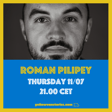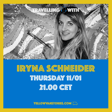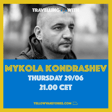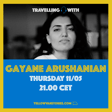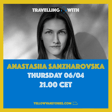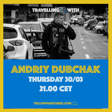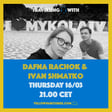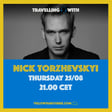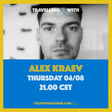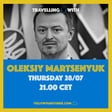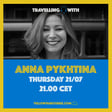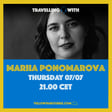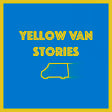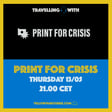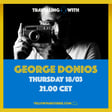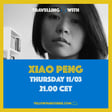Ukraine's Cultural Identity Struggle
00:00:05
Speaker
I think it's a long-lasting imperial narrative coming from different sides, right? From the Russian Empire or Ukrainian lands were also part of the Austro-Hungarian Empire. Then the Soviet Union and these independent years since 1991 as a country, but not as a culture, of course, yeah? They are too short.
00:00:30
Speaker
And also the narrative of Russia in these 30 years was still too strong to make Ukrainian culture and Ukrainian narrative be more present. So it becomes present just, you know, on the burning points, you know, the first Maidan revolution, the Euro Maidan, and now the war. Only in this moment Ukraine becomes present, unfortunately.
00:00:58
Speaker
I think this is exactly the time to break those stereotypes and to say, hey, we are a separate country, we have a long-lasting culture, long-lasting literature, language, despite of all the prohibitions and all the decrees to ban Ukrainian language back then and Russian Empire.
Exploring Identity through 'The Yellow Van Stories'
00:01:23
Speaker
Hello and welcome to a new episode of The Yellow Man Stories. We're so happy and grateful that you have made the time to come on board with us today. I'm your host and driver Bastian. We've been waiting just for you and kept your seat by the window side as usual.
00:01:40
Speaker
After Russia's invasion of Ukraine, the topic of the second season became very clear to us. We decided to invite Ukrainians into the van to share their stories with us and to learn more about Ukraine's cultural identity, because too often it has been appropriated by a chauvinistic Russian narrative. The same narrative now serving as a pretense to the war. Supporting Ukraine, therefore, in our opinion, has a very strong cultural dimension as well.
00:02:09
Speaker
Fonzie is in first gear already and we are good to go. So buckle up and sit back because today we're going to meet Alexei in Berlin.
Guest Introduction: Alexei Isakov
00:02:24
Speaker
Welcome to a new episode of the Yellow Van Stories. Here with us today is Alexei Isakov, who holds a bachelor in linguistics and translation studies and a master of intercultural communication studies, working on his doctorate in philosophy right now. It's an amazing and great pleasure to have you here on board with us today, Alexei. Thanks for taking the time.
00:02:44
Speaker
Hi Bastian, thank you very much for the introduction. Thank you. Well, of course, it's always good to know who is on the other side of the conversation. And I want to just quickly give a brief introduction, like a little further introduction of you, what you do and where you are working, because I think that's already touching on a very important aspect that we will be discussing today.
00:03:09
Speaker
Please go ahead. So, you have, Olexi's been living in Germany for
Ukrainian History in German Academia
00:03:16
Speaker
10 years. I think that's right. You have studied at the European university via Drena in Frankfurt Oder, which is right on the Polish German border and actually has a lot of Polish students and German students. I think it's a fantastic concept because two countries are sharing a university in a way. I think that's a beautiful concept.
00:03:37
Speaker
It is also, and this is what I find very interesting, the only university in the whole of Germany that has a chair for Ukrainian history. And I think that says a lot about the perception of Ukraine in Germany throughout Europe and maybe even throughout the world. And this is something we will touch on in our conversations because I think that is a very interesting point.
00:04:03
Speaker
And obviously with you intercultural studies, intercultural communication studies, your main focus is film and literature, as far as I recall, right? So this is very interesting to dive into, to talk about the cultural idiosyncrasies and the cultural heritage of Ukraine, based entirely on its own merit and not anything else.
00:04:28
Speaker
And that's what I would very much like to jump into with you. And I would first of all, though, like to ask you, how are you doing and how you are from Odessa originally, right?
Personal Impact of War on Ukrainians Abroad
00:04:44
Speaker
How are you doing? What are the news there at the moment? Well, it wasn't an easy time since last six weeks.
00:04:58
Speaker
for me and I think for every Ukrainian person living abroad or stay in Ukraine right now, it's been a hard time. I have a luck that I am from Odessa and that Odessa is still pretty calm if we talk about war action around Ukraine. So Odessa has not been
00:05:23
Speaker
touched at least greatly so far there were some cases of bombings but it's it's been a pretty um yeah there are there were just a couple of cases and uh my parents are there some of my friends are still there and um of course i'm checking the first thing i'm doing in the mornings is checking the news uh what happened during the night because this was also how how i learned about the start of the war on 24th of february
00:05:52
Speaker
And this is pretty much the ritual already for the last six weeks to check the news first when you wake up, if everything is OK or if anything bad has happened. But in general, as you also said, I'm working a lot on Ukrainian topics in research and also on my another position, which I have as a project coordinator for exchange programs with Ukraine.
00:06:17
Speaker
at the same university, at European University, the ADRINA. So this context helps me a little bit to stay in the topic and to keep in touch with Ukraine, especially during this time, which is so important.
00:06:35
Speaker
You said the ritual of watching the news every single morning, I do the same. The first thing that I do is I wake up as well and I check the news. It's become that ritual that's also, and you know, for me, I don't have any family there. So I cannot even imagine what it must be like to do that. Even for me, that ritual is a terrible one in the morning. So I just, yeah, it's hard to imagine what it must be like. And thank you for sharing that with us.
00:07:04
Speaker
Sure. I touched upon the cultural integrity of Ukraine and how there is such a misconception in, I would say, in the West in general.
00:07:20
Speaker
Before we get into that a little bit though, I would first start somewhere else. I would like to start in 2014 with the Maidan uprisings because in the last two weeks, over two or three weeks ago, I watched this film Winter
Maidan Uprisings and EU Association Reversal
00:07:36
Speaker
on Fire. It's on Netflix. And it was an absolutely
00:07:44
Speaker
devastating and disturbing documentary that is very powerful though. It shows you the background to what was going on. It shows you how people sacrificed, protested peacefully, what they were willing to endure for the idea of freedom, how the Bekut police were just attacking them, clubbing them, shooting them, and people still remained in the street protesting for their rights to freedom.
00:08:13
Speaker
Can you give us a little bit of a background to what happened then in 2014? Give us a Ukrainian perspective, because the strong thing about Winter on Fire is it is a Ukrainian film, but I would like to have your take on this as well and how you perceived it. Well, I have to say that I've been in Germany at this point because I came to Germany to study my Masters 2012 and 2013 when the protests started first and then during the annexation of the Crimea.
00:08:42
Speaker
and the invasion of the eastern parts of Ukraine by Russia. I was in Germany already, so I was also sort of watching on the events from the outside. It was very hard. It was probably the biggest shock of my life, especially when you are abroad and you see things going wrong in your country and you don't understand why it goes wrong.
00:09:10
Speaker
You know, why the government acts like that and why exactly your country has to be facing all these things happening. Well, it started with the president. I'm not a political expert in here. You don't need to be. Yes, it's just your take. Exactly from what I can remember from eight years ago as I was perceiving it.
00:09:40
Speaker
The thing was that President Yanukovych, who was in power back then, that he announced association with the European Union for Ukraine, which had a goal of more economical cooperation, but also things like free tourism, like visa free tourism for Ukrainian people and many other things.
00:10:09
Speaker
Of course, the society was not supporting it completely, like 100%. Everyone would say, yeah, we would like to go to the EU, but a big part of people, especially young people, were very excited about that, about this closer cooperation with the European Union and a new perspective, getting away again from this strong connection to Russia and with post-Soviet narratives.
00:10:37
Speaker
just moving to another side. And then in the end, a couple of days before the association had to be signed, Yanukovych announced that it won't happen and that Ukraine will stay more connected to Russian Federation.
00:10:53
Speaker
And this was the point when many people said like, hey, what are you doing now? You're telling us for months now that the association will be signed, that we will have a new perspective, that we will have a new future, more connection to Europe. And now you're saying now we're going back to the years, to the decades of the Soviet
00:11:15
Speaker
sort of oneness and brotherness with Russia again. 180 degree turn overnight, pretty much. Exactly, exactly. It was a very, yeah, very rush return.
00:11:28
Speaker
into a completely different direction. And this is when people went out and first it was students. Like, as I said, mostly young people, they were supporting the idea of getting closer to Europe and also because of new chances for education and jobs and whatever, it can give more freedom, more new perspective for the future.
00:11:57
Speaker
And this is when they went out onto Maidan. And it was a pretty peaceful demonstration at the beginning. It lasted for some days or weeks. I don't remember exactly now. But it was a night when the government sent armed forces to put the students away from Maidan. And this is when the sort of more military or armed
00:12:27
Speaker
conflict has started because people were just staying there, you know, and having a peaceful demonstration on, on coming back to what was promised for such a long time, and what hadn't happened in the end. And yeah, this is when things became bloody, so to say. And there was some people shot at Maidan and next day, there were hundreds of thousands of people going on the street, you know,
00:12:58
Speaker
And yeah, followed by the annexation of the Crimea and the invasion of eastern parts of the country. I mean, I don't know how to explain it, this feeling, because it's difficult for me to explain it to my German friends or any other friends I have from other countries, because like a part of your country is taken.
Crimea Annexation Shock
00:13:23
Speaker
Your country is being independent for like
00:13:27
Speaker
by then almost 25 years. And then a part of it is taken by another country who says, no, you don't need this part. This part is not suitable to you. People there want to join another country. So we will do that. And then they just come and do it.
00:13:50
Speaker
And you are like, Hey, it's possible. It can just be done like that. Right. Just like that. Yeah. And then the international community is like, Oh yeah, we have, we are very concerned. We are highly concerned about the situation. It is so terrible. What happens there? We are there with you, but we can't do anything. And you're like, wow. Is it, is it 21st century right now? Or are we still in some feudal times? You know?
00:14:18
Speaker
when a tribe comes and takes a part of your territory. It's very difficult to explain, but this was the first shock, I think, for me, this big shock when I was outside and I was looking at it from the outside. Also, not being able to do anything, in fact,
00:14:43
Speaker
But this was kind of a preparation for the start of the war, 2022. I'm sorry that it sounds like that, but for me, it was easier to cope with my emotions 2022 now when the war started because I already had this training eight years ago and many people have the same.
00:15:06
Speaker
Yes. It's like an open wound in your country that cannot close, right? Exactly. I'm not a political strategist either, but it seems that it was planned and premeditated exactly for that reason, to keep that open conflict there, to keep it alive, and to then use it as a pretext for this invasion now.
00:15:32
Speaker
Yeah, and Russia's strategy is similar in many countries. In Georgia you have the same, in Moldova you have the same. So it keeps these regions, the open wounds as you said, in many regions to just destabilize them and to possibly, in my opinion, go further when time comes and they think it's suitable now to get some other part of some other countries.
00:16:03
Speaker
You know what was so powerful for me when I watched Winter on Fire was also because for many years now, I have also been following Russia and Russian developments and the politics like anybody else, of course, but I also did feel that NATO and the East expansion and all of that plays a role and we have to be careful and all of that. I still stand by that to some degree as well. But when you watch Winter on Fire, you realize that none of that matters.
00:16:32
Speaker
None of that matters. You see exactly what Putin is afraid of and that is people wanting freedom, gathering in the streets, 100,000 of them asking to be free and asking to make their own decisions without an autocratic regime. Yes, which is not possible in Russia nowadays. It's impossible if you imagine this possibility to go
Western Misconceptions About Ukraine
00:16:52
Speaker
into the streets as we do, I don't know, in Berlin when something is wrong with the legislation or to support Ukraine, you just go out.
00:17:00
Speaker
and show your respect and your being there for some idea. And this is completely impossible in Russia. And you said it very correctly. I think that Russia is afraid of it. Afraid of free democratic country being so close to it and so big as well.
00:17:20
Speaker
Yes, I believe so too. But now we have done exactly what I have already announced in the beginning. We are talking about Russia and not about Ukraine. And this is... You mean the other way around? Yes, well...
00:17:36
Speaker
True. And this is where I want to go to next with you. I realized that when the invasion happened on the 24th of February, it's one of those dates that you will remember forever, I believe.
00:17:53
Speaker
and where you were when you first heard it and so on. I went and I wanted to read about Russian history. That was my first impulse like what's going on and then I realized I'm reading about Russian history but yes okay but this is about Ukraine and nonetheless I'm putting Ukraine inside my mind in the context with Russia. Also
00:18:16
Speaker
If you dig deeper, you realize also, for instance, I realize now Kazimir Malevich, one of the greatest artists, modern artists of the 20th century, who supposedly painted a white rectangle on white background, right? Who was a founder of modern art, so to say. He's actually Ukrainian. We didn't learn that in school. It was Russian painter, like with maybe Ukrainian origin.
00:18:43
Speaker
So once you embark on this journey, you realize that this is the case a lot of the times. So we perceive Ukraine always as a satellite of Russian history, Russian culture. And this is a problem because it backs up the false
00:19:01
Speaker
claims that Putin is making out of the wrong historical context. So this is why today with you, I want to talk about a little more about Ukrainian culture.
Ukraine's Distinct Cultural Identity
00:19:11
Speaker
And also I want to ask you to start with, why do you think that we display this lack of differentiation? And why do we have such a strong tendency to stereotype the Ukraine? Well, you said it correctly that this process of
00:19:30
Speaker
of putting Ukraine together with Russia, be it Russian Empire or Soviet Union or nowadays Russia, together is a long one. And this is true. It's been a tradition of centuries that Ukraine was not allowed to, or let's say Ukrainian lands were not allowed to be perceived as a separate cultural environment. It was
00:19:57
Speaker
always part of yeah and maybe as a origin you say of some artists who then were
00:20:06
Speaker
were not meant or named to be Ukrainian, but they were Russian, Soviet, whatever, not Ukrainian. And I think the problem is really big. This is what we are currently talking about and fighting for, let's say academically in the academic contest, to put Ukraine as a separate country, as a separate cultural space into the minds of people.
00:20:35
Speaker
Because it has a separate language, it has a separate culture, it has separate territory. Yes, it's close to Russia. I would say, unfortunately, we have such a neighbour. But this is how it is. You can't change it geographically. And this whole influence from centuries...
00:20:58
Speaker
It results now in the fact that people know very little about Ukraine. When people are now confronted and it's not a voluntarily confrontation. It's a forced confrontation with a country which hasn't been used in six weeks. When people are not confronted with Ukraine, they have very little understanding of how this country functions.
00:21:22
Speaker
What is it exactly? I'm sure not many people in Europe have ever been to Ukraine, visited for tourism or for whatever other reasons. It changed after several years ago when the visa-free regime was introduced for travelling for Ukrainians.
Cultural Resilience in Maidan Events
00:21:47
Speaker
And also the plane connections to Ukraine got better and cheaper. And that's why many people compared to previously came to Ukraine to see how the country is. But still in the percentage of the whole population of Europe, I think it's not that much.
00:22:08
Speaker
And coming back to your question, where these stereotypes come from, I think it's a long lasting imperial narrative coming from different sides, right? From the Russian Empire or Ukrainian lands were also part of Austro-Hungarian Empire. Then the Soviet Union and these independent years since 1991 as a country
00:22:34
Speaker
but not as a culture of course. They are too short and also the narrative of Russia in these 30 years was still too strong to make Ukrainian culture and Ukrainian narrative be more present. So it becomes present just in a, you know,
00:22:53
Speaker
on the burning points, the first Maidan revolution, then Euromaidan, and now the war, only in this moment Ukraine becomes present, unfortunately. But I think this is exactly the time to break those stereotypes and to say, hey, we are a separate country, we have a long-lasting culture, long-lasting literature, language, whatever,
00:23:20
Speaker
which goes back to 19th century or even before. If we talk about, for example, Ukrainian literature, it starts in the 18th century already, or at least this is what
00:23:36
Speaker
the classical Ukrainian literature, what you can show as a piece of work and say, hey, this is written in Ukrainian back then, despite of all the prohibitions and all the decrees to ban Ukrainian language back then and Russian Empire. Ukrainian film started in 1920s in Kiev with Dovsenko, for example, one of the very famous, I think, directors worldwide.
00:24:05
Speaker
and so on and so on. And Kazimiro Vallevic is also a good example. He's Ukrainian, but hardly anyone thinks of him as Ukrainian because... Soviet Russian, a lot of people would say. So there was a big success story of that Russian propaganda, the Soviet propaganda in that sense, because the cultural chauvinism as it exists is still stemming forth from that in a way, right? Absolutely. I'm here with you. Absolutely. Yeah.
00:24:32
Speaker
So and we are here to break with that pattern a little bit today. Exactly. We try. All we can do is try, right? All we can do is try to give a little bit of another footing of all of this. So I want to start off about Ukrainian
Art as Expression of Conflict
00:24:48
Speaker
culture. I saw a report that I found very, very, very good about Archon Bolokhiting. Do you know him? He's a Russian painter. Okay.
00:25:02
Speaker
And he has, ever since 2014, he is, before then, he's a modern artist, of course, paints and oil, and he did portraits and, you know, some hyper-realism as well. But ever since 2014, he moved away from that in a way, and he started making large-scale paintings of bomb explosions.
00:25:23
Speaker
as an answer to the Donetsk and Luhansk invasion of Russia and the annexation of Crimea. And he calls it the beauty of lethal irreversibility.
00:25:40
Speaker
It's amazing work because he sees, for instance, the moment of an explosion in nature is an incredible, beautiful event, but in the hands of humans, it is a catastrophe. And obviously, everybody can agree on that. And when I watched this, and then I watched also your recommendation, your film Rocky recommendation, of course, Shadows of Forgotten Ancestors, a film of the 60s.
00:26:04
Speaker
which struck me very much with amazing imagery, beautiful imagery. I think it was shot in 16 millimeter film, these rich colors and this kind of chiaroscuro effect. Everything is just light and dark. It's very beautiful.
00:26:19
Speaker
to watch. And, and it is nonetheless also for me a little very poetic. The storyline is a little looser to me, but it's really about the power of the image. And it's like it's like it's almost like a pagan ritual, the film as well. And there's a lot of culture in this like the Christmas scene, for instance, like where they wear all these masks and and all of this. So if you want to start with something, this is a very good starting point. And thank you for recommending that film. It is fantastic. And when I watched it,
00:26:49
Speaker
And this is where it all ties in a little bit. It's like it's dealing a lot with suffering, with personal exploration and fate in that sense.
00:27:05
Speaker
And what it does, it turns it into almost a transcendental experience. And this is, I think, what I saw in Volokitin as well. Would you say maybe this is because Ukraine, they have suffered a lot throughout Soviet history, also before then, like with the Austro-Hungarian Empire and so on. Do you think this is maybe a starting point, like one of the strengths of Ukrainian culture in general, that they can turn this suffering, this fate
00:27:34
Speaker
into a transcendental expression and experience? Not limiting it to that, of course. Yeah, exactly. That's what I wanted to say. I wouldn't limit it to that.
Preserving Culture Underground
00:27:46
Speaker
Of course, Ukrainian culture and Ukrainian people suffered a lot, but this is still not the main narrative of Ukrainian culture. And it shouldn't be, of course.
00:27:57
Speaker
Yeah, because also the Russian narrative often says that Ukrainian literature and Ukrainian culture is just the culture of suffering for centuries and it doesn't have anything, meaning that there is nothing meaningful in it by saying that, you know, this cultural chauvinism that you mentioned. But I think, yeah, it's kind of strength, you know, if I
00:28:23
Speaker
Come back to my experience in 2014, I've been strengthened by that experience to prepare for 2022, sort of, and I think this can be put on the cultural sphere as well. If your language is prohibited so many times, if you are not allowed to publish, if you are not allowed to spread your works, if you are not allowed
00:28:48
Speaker
I don't know, to speak Ukrainian or to stand for your cultural values, then you find new ways. You somehow find the ways you go into the underground publishing, you use help of the
00:29:08
Speaker
international community of Ukrainian diaspora who moved out of the country, how it was in the 20th century, for example, is publishing works in Ukrainian, or publishing works which were ideologically false for the Soviet system. So I have to say, because this is not an experience, you used air quotes there, just saying.
00:29:34
Speaker
I mean, ideologically false could be anything, right? You never know what is seen as ideologically false. This is also part of my research. It's arbitrary. It's very arbitrary. It's an absolute objective, right? Oh, sorry, subjective. I mean, subjective, absolutely subjective.
00:29:54
Speaker
you look at one person looks at something and says, okay, it's fine. And the other looks at it and no, no, no, it's too much. It's not going along with social, social, yeah, this socio realistic perspective, or I don't know, Soviet ideology, and it should be prohibited. And the author has to be like sentenced to death or something. So in a way, this suffering, of course, it's it's a source of strength and source of motivation to find
00:30:23
Speaker
New ways in somehow being able to express yourself and express yourself in the language that you would like to do it in and the way you would like to do it.
00:30:34
Speaker
It takes pressure to create a diamond. I think that's something that comes to mind at least when we talk about this. Having said that as well, would you care to share a couple of maybe Ukrainian national treasures? I know this is like a canon. I know this can be entirely subjective, but also to have something that we can link to.
00:31:00
Speaker
It can be food, it can be literature, it can be anything that comes to mind from your perspective, your very subjective perspective. What are Ukrainian works of art that you enjoy? You go to solace as well, you go to, you know, inspiration. Yeah.
Literary Figures as Cultural Icons
00:31:23
Speaker
Well, speaking about literature, Tarasovchenko is the Ukrainian poet of all times, at least so far. When did he live? He lived in the 19th century. So this is if we talk about classical Ukrainian literature. If we move to the 20th century, for example, there were lots of
00:31:52
Speaker
lots of literary artists. One of the last that I was also translating her poetry into German, because there are hardly any translations of her or there are some translations of her poetry, but but only of a small part. Her name is Lina Kostenko. And this is she's she's living she's in Kiev now as far as I know, she's 92 years old. She had a great life which inspires me
00:32:22
Speaker
in an enormous way because during this whole Soviet time she lived through, she kept fighting for the freedom of word and for freedom of expression of artists as you are. So for me, she's one of my favorite Ukrainian poets of modern times.
00:32:54
Speaker
Also, Sergey Zadan. I like him a lot. He was nominated for the Nobel Prize in Literature this year. He's nominated, yeah. He is originally from the east of Ukraine and he's, I guess in his 40s right now, writing a lot on modern topics.
00:33:22
Speaker
you know, concern in Ukraine. He has lots of interesting works and they are also translated in many languages. These are just three examples. And I actually also suggested that you read this work by Valerian Pitmohilny, which is called The City or Distat. This is a book which has been translated into German, for example, in March.
00:33:51
Speaker
this year. And he is, he's one of the, or one of the main figures in Ukrainian modernist literature. So maybe this just comes to my mind right now. But of course, there are many, many more in literature, if you talk about literature.
Iconic Ukrainian Films
00:34:08
Speaker
If you talk about film, for me, it's of course, like,
00:34:14
Speaker
Let me start chronologically as well. It's Dovsenko, Alexander Dovsenko. The film studio in Kiev is named after him since the 1950s. And he's filmed the Earth. It's one of the masterpieces of the 1920s. It's a great movie in my opinion. Oh, I will watch it.
00:34:39
Speaker
please do please do yes and and also just to stretch just to stretch we're going through this and we're making kind of like a list well a list but making these recommendations so that everybody i will link to it obviously so that everybody can find it and because this is a way to um you know to change to have ukraine being uh
00:35:01
Speaker
as a cultural integrity. And it's up to us to value that and to examine it. Yes. So I will definitely watch that. Yeah, this is for the beginnings of the Ukrainian film. And then if you go to the 60s, yeah, this is my research here right now. And of course, the film that you have already mentioned, Shadows of Forgotten Ancestors.
00:35:29
Speaker
There was a list made by Ukrainian film artists a couple of years ago. There was a voting procedure to define 100 of best Ukrainian movies of all time. I think it's also available in English. If you Google it, just 100 best Ukrainian films. And these Shadows of Forgotten Ancestors was voted for Place One.
00:35:59
Speaker
So it's number one on the list of 100 best Ukrainian movies. It's based on a literature piece of Mikhail Okutubinsky from 1911 and tells the story of a couple who are unable to love each other because of social circumstances, because of the
00:36:28
Speaker
because of the environment they live in and the society how they perceive it and because of family arguments. So it's a little bit like Ukrainian, Romeo and Juliet piece which it is also often compared with but still I would say it's something different because the environment is absolutely different. They live in a
00:36:50
Speaker
in the village, in the mountains, in the Kapatian Mountains, and also surrounded by this. Beautiful landscapes. Absolutely. Yeah. And the director, Serhiy Parazhanov, he showed it beautifully, like, as you said, the coloring of the film, but also the camera work of the film. It's amazing. When you understand or when you think about it, this film was made in 1964 or finished in 1964. It's
00:37:20
Speaker
crazy how post-modern and neo-Avengeristic it was already. Yes, they have like cray shots in there. They have like a steady cam work almost in there. They have amazing pans in there. I think to me, one of the best things in the film are the close-ups, like the close-ups of the faces. They're so beautiful. They have such a sharp, they're such a beautiful color, such a strength of expression.
00:37:49
Speaker
I really loved that. Fantastic film. So to everyone who would like to watch it, if you haven't done it yet, please do. I'll just say you, Link, write the one you said to me.
00:38:06
Speaker
A lot of music in there as well. So this is also why it's so beautiful because it's not just the story. It says a lot about society. It also carries the music, like I said, the Christmas scene, for instance, with the pagan rituals and so on. I think it gives a very nice starting point for Ukrainian culture. And that's why I really highly recommend it as well. And the link that you've mentioned, it's also a great project, I think, because it's a website called Takflix.
00:38:32
Speaker
done by some colleagues from Ukraine. It's basically a website with very well-restored copies of films from the past, but also with the newest Ukrainian films as well. There are many, many films there right now, which you can watch for a very small price.
00:38:53
Speaker
And it's also contributing, the paying for this is also contributing to the film.
00:39:04
Speaker
film community of Ukraine, especially right now. Amazing. So it's very much recommendable. And an important, yeah, tagflix.com, I think a link to it, of course. But no, I think it's an it's an amazing project. And these projects are so important. And like, like I said, in the beginning, I realized it's important more than ever now, that you have these databases, these independent databases where people can access these works of arts and culture. And so a very important
00:39:33
Speaker
website and project and worth exploring as well.
Depicting Contemporary Issues in Film
00:39:37
Speaker
I think once you watch Shadow of Forgotten Ancestors, just stay around a bit and see what else you can find. There's plenty more. Exactly. If we stay with the film, maybe one more example that I've watched recently at Berlinale in February 22. It was directly before the beginning of the war. It's the film called Klondike.
00:40:05
Speaker
by the Ukrainian director, Maria Gorbachev. And she's telling the story of the Malaysia Airlines plane crash in 2014 in the context of the beginning of invasion by Russian troops of the areas.
00:40:29
Speaker
It's a very, it's a very strong but also very difficult movie. Very, like, dramatic and intense. But also very truthful in its showing the atrocities of the war. And still in the end, it leaves the hope. I would say this film was also marked at the it got
00:40:56
Speaker
the prize at Sundance Film Festival in the US at the beginning of this year. And from the latest movies, this was the movie that impressed me most. Yeah, this is if we talk about film.
00:41:13
Speaker
Can I ask you what do you think could happen on a European level to strengthen Ukrainian culture and to make it come more to the foreground and emancipate it from this enormous grip that Russian culture has on it, at least
00:41:33
Speaker
it seems to me that way. And I think you agree with that as well, that a grip in outside perception, not Ukrainian culture itself, which stands on its own, but the perception and what could be done, like programs, politically, what decisions need to be made to strengthen that.
00:41:53
Speaker
Well, I think the first step by doing this podcast, for example, we're already contributing to this, you know, by giving some examples of Ukrainian cultural works and trying to attract attention to it and to get people interested in it, I think. Or at least I hope that the
00:42:16
Speaker
the whole seriousness of the situation right now, it will help people to see more in Ukrainian culture. And this is one of the ways how you can promote it. Be a catalyst, maybe. Make it more present.
00:42:43
Speaker
offer and demand things. So if people demand more Ukrainian culture, then there will be more offer as well. So we should not forget about this approach, I think. I don't have right now like ad hoc examples of what should be done.
00:43:09
Speaker
concretely on political level, for example, but also in the academia, it's very important to start to see Ukraine. And this is what the colleagues from also from the Entangled History of Ukraine chair at Wiadrina stress all the time. It's very important to see Ukraine not as part of, yeah, but as an independent cultural, political unity.
00:43:38
Speaker
which can give a completely new perspective to the research of it, to research of its culture, to research of its language, history and so on and so on. And also might give a new perspective to, for example, to Soviet and post-Soviet studies, because it brings another view from the Ukrainian perspective.
00:44:03
Speaker
Yes, like also maybe split up post-Soviet studies a little more. Maybe that wasn't such a good job and just throwing it all into one big pot and stirring a little bit. And I think in a way that's happened. The example is having only one chair for Ukraine history in the whole of Germany. So from my point of view, and then I read an interview with the professors at the Vienna and they also said,
00:44:28
Speaker
that in the past, in order to do Ukraine studies of any sort, sometimes it was enough to speak Russian. You didn't need this to speak Ukraine. And obviously, if that's the case, then that will perpetuate the status quo of perceiving everything through Russian literature, Russian writing, and will keep the voice of the Ukrainian side entirely out or to a minimum.
00:44:56
Speaker
This on an academic level has to change, I believe, and more chairs of Ukrainian history will have to be installed at the universities and so on. So this would be some concrete steps that could be done and maybe something will come from that. And obviously from people just consuming and watching Ukrainian culture and seeing it in its own right. Yeah, absolutely.
00:45:18
Speaker
Speaking of film, this is something that I also find very interesting because we talk about culture and the influence it has, the power it wields also.
Zelensky's Cultural Influence Transition
00:45:28
Speaker
I think this conflict is a shining example of that, a terrible example of that.
00:45:34
Speaker
But you know, Volodymy Selensky himself comes from culture. He was the figurehead of a movement and he got there because of his position in culture and arts, in television. Can you describe the phenomenon
00:45:52
Speaker
Volodymyr Zelensky, a little bit. How could someone that is actually, and I say this in the most endearing way, who is a clown, he is an entertainer, a comedian, right? Comes to the country's fore and becomes president. How could this happen?
00:46:13
Speaker
Well, at least I would use the word comedian. Because, you know, because in the current situation, you don't see anything of being a clown there like nothing and even nothing of being a comedian. Yes. He's in the current situation. He is, I think, I mean, I'm very happy that he's president right now in this situation because he can present Ukraine in the way that
00:46:43
Speaker
you know, makes its way to the minds of people all over the world. And I'm very happy that he's the president now. I did not expect to be like, again, I can only speak from my subjective perspective, right? That's why you're here. When he was elected, I was surprised by the overall support.
00:47:10
Speaker
from Ukrainian people that he got, because he got, I think, around 70% in the end of support during the elections. This is also, you know, this is kind of, I think it's part of this freedom that Ukrainian people want to feel.
00:47:30
Speaker
Can you imagine other countries, or of course there might be some examples, but there are not so many countries where people are free to choose a comedian and a TV star as a president. And this is also, I think, something that Ukrainian people wanted to finally feel, that they are able to do this.
00:47:53
Speaker
And because it's so different from the political establishment, right? Where everybody came from as well. Exactly. Of course, it has also to do with this lack of support of political establishment.
00:48:04
Speaker
Yeah, because people don't have much trust after, you know, after constant changing of presidents and after Yanukovych steps on European integration, for example, they just had very little trust, I guess, in the political establishment as it is. So I can imagine many people saying like, hey, if we till now only elected politicians,
00:48:34
Speaker
And it didn't work. Where are we now? It didn't bring us anything. Why wouldn't we just go against all of them and select Zelensky as a person who is far away from the political elites right now? Let's give it a try. What could be worse? What could possibly happen, right? I would be more like, let's give it a try. Can we do it? Can we do it like this? Let's try. And I would compare Ukraine here
00:49:04
Speaker
with a young person or a teenager who wants to feel the limits, how far it can go, or just to touch the ground and understand what works and what is working and what is not working, like a young, unexperienced person. The country is officially the country, Ukraine. It's young.
00:49:30
Speaker
And of course we need time to try out things. And this is, I think, what happened when Zelensky got elected. But to repeat it again, I'm personally happy that he's president now because he's very present, he's very clear-minded, and he finds he and his team, of course, they find, in my opinion, right words to support Ukrainian people in this very hard situation, but also to
00:49:59
Speaker
find the way to reach international politics and international leaders by giving all those speeches in the UN to different presidents, a Grammy ceremony and so on and so on. This is a great example, I think, of how you can use your media experience in reaching people in such a hard moment.
00:50:25
Speaker
Absolutely. And just to qualify my clown in the beginning, because I didn't really mean that in any disrespectful way, because I do believe clowns actually have a very serious side to them, that that is very often a part of it that lies a little deeper, though. And, and so I meant that really just presently, because I also agree with you entirely, he is, he is
00:50:48
Speaker
doing an amazing job in an incredibly, incredibly difficult time. And the way he sticks to his guns, even though that's probably not the best expression, but he stays with his people, with his country. And there's no easy way out for him. He's like, I'm with you. And this is so inspiring.
00:51:07
Speaker
I would almost go as far as to say that he's becoming a cultural treasure himself right now, and maybe in years to come we will see Selensky on t-shirts like we see Che Guevara now, but obviously only time will tell. But I think he's on a good track of achieving exactly that.
00:51:26
Speaker
the servant of the people also is really dealing with the corruption. And there's the scene where he before he becomes president, where he has, he's raging, like he does a speech in school. I watched it, he does a speech in school, he's confronted by someone, I think the class was canceled or something like that because of a mathematics. And that's why, you know, his history class is canceled. And he has this incredible outburst of rage and, and, and
00:51:54
Speaker
and goes on and on with the worst words you can imagine. And it goes viral on YouTube because one of his students films it, right? And only because of this outrage in the end, he actually becomes elected because people actually identify with this outrage.
00:52:09
Speaker
So I think on a larger scale, this whole series, The Servant of the People, which is great, it's on Netflix, you should watch it, deals with that and the public feeling of being utterly ruled by powers to be that you have no control over.
00:52:26
Speaker
impersonated that, or he was the figurehead of exactly that. And that's why people voted for him. So I think he just was in the right series at the right time to tap right into that feeling. And this is what carried him all the way to the top, to some degree, and shows the power of culture in that sense that it has. In a way, yeah. Sorry, there wasn't even a question in there. Terrible, anyway.
00:52:59
Speaker
I have now actually coming already to the end a little bit, but I would like to have your opinion on something because when we talk about culture, there has been an event lately in Germany that did cause a bit of an outcry and was very controversial.
Peace Concert Controversy
00:53:18
Speaker
Having lived in Germany for 10 years, you know the country quite well also.
00:53:24
Speaker
probably better than me at this stage. Anyway, and there was supposed to be like a piece, a concert in the palace Bellevue where the German president resides with the Berlin Philharmonics. And they were supposed, they were playing Russian pieces, apparently also Ukrainian pieces, even though in retrospect, I heard they were like two
00:53:50
Speaker
Ukrainian pieces and I think a bit of Champagne and the Berlin Philharmonic were to a large degree Russian musicians with a few Ukrainian musicians and together and Belarusian musicians and together they wanted to have a concert perform these pieces for peace.
00:54:08
Speaker
And the Ukrainian ambassador, Andrei Melnik, in Germany, he protested and said, this is a terrible idea. I am not even going to attend this. And he did so quite loud on Twitter as well for the world to hear. At first, I was a little bit, yeah, but a concert for peace isn't a bad thing.
00:54:27
Speaker
Right. And then I thought about it a little bit and I read some articles and also about from Ukrainians and also how they said to some events they weren't even invited or couldn't speak on stage, whereas some Russians could and so on. So that made me think. And now instead of explaining what I think, I would like to hear from you. Why do you think that is so controversial? Why? Why is that a problem? Because of the war. If not for the war,
00:54:58
Speaker
then you can do whatever. You can talk about peace and unite people and everything. But as long as the war is going on, I'm with Andrii Melnik here. Absolutely.
00:55:09
Speaker
It's, you know, it's for me seeing every day opening the news channels and seeing dead people and bombed houses and millions living the country. And then hearing about this, the concert of uniting people and playing for peace, it sounds very childish and naive. It's just a very naive thing to do in such
00:55:39
Speaker
circumstances, not in general. Yeah, of course, it's a great idea if it would be, if it was like, peaceful times. And the president just invites, you know, our ambassador to join, and maybe other ambassadors as well and say, hey, we're playing here for the understanding.
00:56:02
Speaker
And for strengthening peace in the region and so on and so on, that would be okay from my point of view. But in the time of war, it's not the thing that you can do.
00:56:16
Speaker
I think it also taps a little bit into this cultural chauvinism that we have already discussed, that Ukraine always has to be perceived in a context of Russia. As a part. In a piece concert, it is predominantly Russian music and Russian musicians with a few Ukrainian musicians and pieces to at least maintain the impression that this is on an equal footing.
00:56:43
Speaker
I absolutely agree with that now because I have to actually quickly check. I read this piece by a Ukrainian singer and she made me aware of why it is a problem by comparing it to the Second World War, imagining that Germany had just invaded Poland.
00:57:04
Speaker
And then for peace, you know, the London Philharmonic together in London with the German musicians and a few musicians and they play mainly Wagner and Beethoven and a couple of Chopin pieces. How would that have gone down in Poland, right? And this is almost exactly the same. And that's why I was like, yeah, hold on a minute.
00:57:25
Speaker
It all sounds good and it looks good at first, but also culture has to be very sensitive, especially in these times. And not everything that is cultural is good.
00:57:37
Speaker
This very apt comparison is by Mariana Sadoska, a Ukrainian singer living in Berlin. And I read it in the German newspaper Zeit online. But as it is paid content, I won't link to it. But what I will do is I will link to Mariana Sadoska's Wikipedia page so you can get a better impression there. And now on with Oleg Si.
00:57:58
Speaker
Yeah, exactly. That's a very good comparison. Thanks for mentioning it. It's very good. You change the perspective, right? You change, especially when you look at historical things that happened some decades ago and where
00:58:13
Speaker
The understanding of what had happened is a little bit more stable than it is right now when the events just evolve. That's a very good comparison. If I may make one more comment because you also mentioned music.
00:58:32
Speaker
I just wanted to, and before you asked me for some suggestions, there is a great Ukrainian composer, for example, his name is Morozlov Skorik. He died in 2020. I mean, in a way you can say he was happy not to see the war, but his influence and contribution in the 20th century Ukrainian music is huge.
00:58:58
Speaker
And he also wrote the music for the film Shadows of Forgotten Ancestors, for example. But he also has classical pieces. He has big forms in classical music. And this is, for example, one of the composers that you can choose for such a concert, or also a more classical composer whose name is Mikola Lissenko, who was
00:59:23
Speaker
who was living in the 19th century and at the beginning of the 20th century. So there are great examples, you know, also influenced by Ukrainian traditional music, beautiful pieces, but still coming back to this concert, now you need to play something Russian. So, in a way, there are things to choose, but somehow
00:59:50
Speaker
It's not always happening, unfortunately. That's why also in this sphere, in the sphere of classical music, there are opportunities.
00:59:59
Speaker
Yes. And I think the only way to put it in this particular situation for me, where we are right now, I think what needs to happen on all sides is to strengthen Ukrainian culture and not to water it down. And I think that's what happened at that concert. It was kind of watered down. It was kind of put into a bigger context again and with Russia. And this is something
01:00:22
Speaker
that we should be avoiding and really just focus on the cultural integrity of Ukraine by consuming, watching, listening to Ukrainian culture. And I can't believe we forgot music earlier when we contemplated like the canon, because music, I mean, please, by all means, music, you know, makes the life so much sweeter.
01:00:43
Speaker
So I think this is what happened and that's why it was very problematic. And it taught me though as well that, you know, always keep on exploring a topic. Don't settle for the first impression that you have of things. Don't be like, yeah, but that's okay.
01:00:58
Speaker
Allow yourself to doubt your own thoughts and to go deeper. Don't form an opinion right away. And also listen to the people who have a better perspective. And my perspective is not the better perspective. The perspective here of a Ukrainian is definitely the better perspective because they know what's going on. And it is about them who we are talking about eventually anyway. So that's why that was problematic. Yes. I'm very grateful to you for these words and also for including my voice.
01:01:27
Speaker
into your podcasts because it's very important nowadays to listen to Ukrainian voices. Not to just listen to someone who has an opinion on Ukraine or on Ukrainian voices, but just to listen to the voices themselves. This is one of the things that I've studied in my Intercultural Communication Masters, just be open for another perspective.
01:01:53
Speaker
Yeah, don't judge as you say also, don't form the opinion right away and don't judge the perspective only because it's different from yours. Try to think deeper and try to understand why these people are having this opinion or why Ukrainians are
01:02:10
Speaker
so against being seen together with Russia even in the times of war, even in the times when no cultivated dialogue can be possible. I'm very grateful to you for this point.
01:02:30
Speaker
also hope that the interest to Ukrainian culture in general will be growing and will be more present. And of course, from our side, from the side of Ukrainians living and working in Germany, we will also try to do our best to contribute to this.
01:02:49
Speaker
Yes, I'm sure you will. And thank you for expressing that gratitude. Gratitude is all mine for you to make this time to be here with because I really think this is a very important subject right now, always when there's conflict as well, what you focus on. And so I'm very, very grateful for you to finding this time. And you just brushed on this, you know, that we need the dialogue and everything now more than ever. And
01:03:17
Speaker
having that in mind, I'm also wondering, you know, a war started overnight. It's very easily done. It's a marching order and it happens it's there.
Culture in Post-War Healing
01:03:28
Speaker
But to heal the wounds will take a generation or more generally. So how do you think that now culture can serve in a way to make
01:03:42
Speaker
a future possible, because the facts won't change. Ukraine will have a border with Russia. And that won't go away. So sooner or later, there will have to be something of a settlement, of a looking to the future. And how could that even, I mean, I know it's difficult to even ask that now, but I wanted to do it anyway. Right now, everything is so fresh, maybe it's also too early.
01:04:09
Speaker
But I'm just wondering, what can culture contribute to this dialogue that will eventually happen? I think, unfortunately, I don't have an answer to this as well because, as you said, the wound is so fresh that you can't think of. I mean, of course, it's important to make plans for after the war, but the first task is still now to stop the war for me personally and for people to stop
01:04:39
Speaker
dying and suffering. So I'm sure there will be ways after the war is finished and when the wound is a little bit closed, not so fresh. There will be definitely ways for culture to contribute to the stability of Ukrainian people and
01:05:07
Speaker
yeah to make the future for it and this is actually what our artists are doing nowadays yeah just to make a I don't know a trivial example of our band Carlos Orchestra going to Eurovision for example yeah
01:05:25
Speaker
But now they announced that they will be in Torino in May and will proudly present Ukrainian language. Their song is completely in Ukrainian, for example, Ukrainian culture and just their country on an international scale. So these are the small steps, I think, which all contribute to
01:05:48
Speaker
to the dialogue and to representation of Ukraine in future also. But for me, it's very difficult right now to say how it's going to look like. I'm sure it will work and ways will be found. But first, the war has to be stopped.
01:06:07
Speaker
Yes, I absolutely agree, of course. And nothing else makes sense also. I think that's an incredible service that, what is the band called? Sorry, that are going to Eurovision. Kalos Orchestra. I think it's an amazing service to Ukraine to be going there at this moment in time because everything we've been discussing today
Eurovision as Cultural Statement
01:06:32
Speaker
is culminating also in there. I mean, you can think about Eurovision Song Contest however you want, but I think people will perceive this, without a doubt, performance a lot different than they would have in any other circumstance. And now when we need to strengthen Ukrainian culture, this is just one of those many opportunities where that can happen. I mean, in my opinion, sorry, it's all just a short comment also on the song. It's not just a regular pop song.
01:07:01
Speaker
In my opinion, it has a much deeper meaning. It's called Stefania. Even written before the war, the song is being sung to the mother, whose name is Stefania.
01:07:21
Speaker
Now, also for Ukrainian people, it has such a big meaning because it's kind of a song to all mothers who wait for their sons, for example, or who are worried about their sons who are fighting for Ukraine. But in general, also in a more
01:07:41
Speaker
global sense to all mothers and their love to their sons. So I think this will be a great presentation, representation of Ukraine and hope also that the song will be perceived with all its depth by others.
01:07:58
Speaker
That's wonderful. Also the way that you described it. Yes, absolutely. I think it's a song, especially for this moment in time as well. And like I said, you can think about the Eurovision song contest, whatever you want, but it has an incredible reach. It has an incredible reach all over Europe. And this is exactly also the messages that we need, I think now. Now in closing,
01:08:24
Speaker
What is your hope for the future of Ukraine, besides the obvious that the war ends as soon as possible? What are your other hopes? That it will keep its territorial integrity, that all of the parts of Ukraine that belonged to it, starting from the independence and even before, during the Soviet times, like Ukrainian Socialist Republic times, that they will be back.
01:08:56
Speaker
And also that my big hope is of course that Ukraine will join the EU sooner or later, because it will mean a lot of simplification of things for cooperation with European countries and also for European countries to come to Ukraine and cooperate. Do you think that's going to happen?
01:09:29
Speaker
There is a long, long way to be done before it can happen, I'm sure. Or I mean, it's long, not in the sense of time, but in the sense of how many things still have to be done for Ukraine to join the European Union. But I mean, it's a matter of effort, I think. And
01:09:52
Speaker
I hope very much that sooner or later it will happen. As I already said, the war will stop as soon as possible.
01:10:05
Speaker
Of course, Oleksiy, it was such a pleasure. In closing, this is really my last question to you, or maybe recommendation. Because in closing, I also want to make sure that people maybe know where to turn to if they want to help and support. And help and support are so necessary everywhere in Ukraine right now. Do you have anything
01:10:27
Speaker
any place where you say that if you have five euros to spare, give them there, or if you live in Berlin, go there. Are there any initiatives you support you know of that you want to recommend here?
01:10:44
Speaker
Well, from my opinion, in a way, I might do a little bit of advertising for my university right now. But in my opinion, this is one of the very important things that the Adrena is doing right now. We have opened an account for donations for Ukraine.
01:11:06
Speaker
And what we do with these donations is we support Ukrainian academics who flee to Germany or would like to come to Germany and continue their research here for some period of time until the things are getting calm again. And also we support with this fund, we support financially Ukrainian students who come to us as emergency
01:11:35
Speaker
exchange, for example, on emergency exchange days. This is what we do being here, and this is what we do to concrete people who suffered the war. So I think, yeah, if you Google... A link to it. A link to it. Okay, perfect. A link to it in the show notes, everything we discussed today, a link to in the show notes, so that you don't, that all people listening don't have to, you know,
01:12:01
Speaker
I was on Google, but they can go straight there, so I will link to that. And I think we covered very well today why that is important and why because this is not the short-term help, it is also short-term, but it's also long-term help in that sense. Supporting the academics, he also means to put Ukraine truly on the map.
01:12:21
Speaker
culturally, academically and to form collaborations in that sense and enable them here to do their work will benefit us all and I think will make it a more peaceful Europe hopefully in the long run. Of course there are many many also many initiatives in Ukraine or other organizations
01:12:41
Speaker
gathering money for Ukrainian soldiers, for example, for the support of Ukrainian army. If you would like to do that, I would maybe just briefly mention the special accounts, bank accounts opened in Ukraine by the Ukrainian National Bank. But also, yeah, just finding organizations which seem to be
01:13:10
Speaker
yeah, reliable for you personally, and then making a donation there. I personally, I contacted my friends in Ukraine and asked them what they needed at some point of time. And I did a small like donation campaign on my own, just to, you know, to support people who I know personally. But of course, there are also many good volunteer organizations that
01:13:38
Speaker
cover the needs of Ukrainians in Ukraine right now. And I think it's up to everyone to just choose the one which seems reliable to you and do a donation there. That would be, of course, great.
01:13:53
Speaker
which doesn't mean that we will not link to your recommendations to follow that. If you want to find something else, if you want to have the extra work, no problem, you're free to do that as well. Of course, who are we to say what to do or not? Alexei, it was such a pleasure. I'm really grateful for you to take this time. I think this is a very important topic, which I'm sure will make also an occurrence here and there in other episodes. But this was very insightful and linking to all these things.
01:14:22
Speaker
I think now everybody who's listening who wants to just immerse themselves in some Ukrainian culture to understand what makes Ukraine so special and beautiful and worth defending by so many of its people, they have a starting point now, hopefully after this conversation. Thank you so much. Have a wonderful weekend. It's Friday. Have a wonderful weekend. And I hope that we speak soon again. Thank you very much for the invitation. It was my pleasure as well. Thank you.
01:14:50
Speaker
And with this, we're at the end of this week's journey in the Yellow Van. Thank you very much for coming along today. We hope you had a good, but not too comfortable ride. Thank you, Alexei, for your trust in me and the work we do at Mind the Bump Productions. You will find all links in the show notes, including the recommended initiatives and organizations to donate to if you can.
01:15:13
Speaker
If you're a Ukrainian and would like to come on the show or if you know someone who should, please don't hesitate to contact us. We are happy and grateful for anyone reaching out to us on www.yellowvanstories.com where you can also leave us your general feedback or ideas for improvements. We hope to welcome you back next week for a brand new episode. Until then, keep loving in the face of fear and stand with Ukraine. Take it away, Jim.
01:15:55
Speaker
But my message is clear Get loving in the face of fear
01:16:25
Speaker
And I know my attitude disturbs you and so we should And I know my fantasies untrap me to those like me
01:17:12
Speaker
The message is clear You're loving in the face of fear
01:17:20
Speaker
All you standin' for your rights It's the fact of your life
01:18:12
Speaker
All you stand is for your rights.

